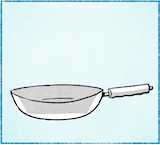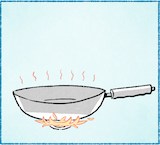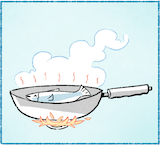


นี้คืออี่หยัง นี้คือกะทะ
กะทะมีไว้เฮ็ดหญัง กะทะมีไว้ถ้าทอด มีไว้ถ้าเฮ็ดแนวกิน
กะทะมีด้ามพ้อม ด้ามบักญาวหนึ่ง เอาไว้ถ้าจับ เอาไว้ถ้าจับญามเฮ็ดแนวกิน
ด้ามกะทะเป็นเหล็ก แล้วมีพะสะติกคุมพ้อม เอาไว้ถ้ากันความฮ้อน
กะทะทอดได้หลายอย่างบ่ ทอดได้อยู่ กะทะทอดได้หลายอย่าง ทอดปากะได้ ทอดหมูกะได้
แต่ว่าญามทอด ต้องใซ้น้ำมันพ้อม มันจั่งสิทอดได้
7
กะทะอยู่ใส กะทะค้างอยู่เทิงไฟ ค้างอยู่เทิงเตาไฟ
เตาไฟเป็นเก่ด มีเก่ดพ้อม
อยู่เตาไฟมีเปวไฟบ่ มีอยู่ มีเปวไฟพ้อม
แล้วมันฮ้อนบ่ ฮ้อนอยู่ มันฮ้อนบักคัก เปวไฟมันฮ้อนกะด้อกะเดี้ย แล้วมันตาย้านหลาย ตาย้านบักคัก
คนสิเฮ็ดแนวกิน ญามอยู่ใก้ไฟ กะต้องละวัง ต้องละวังคักๆ พ้อม มันจั่งสิบ่ตาย้าน มันจั่งสิบ่อันตะลาย
8
มีอี่หยังอยู่ในกะทะ เขากำลังเฮ็ดแนวกินอยู่ในกะทะ เขากำลังทอดปา
ทอดปาอี่หยัง บ่ลู้คือกันจักปาอี่หยัง
โตบักใหญ่หนึ่ง โตส่ำกะทะเอาโลด
เห็นฮอดหัวของมัน เห็นฮอดหางของมัน เห็นฮอดคีบของมันพ้อม
อยู่ข้างกะทะมีควนไฟบ่ มีอยู่ อยู่ข้างกะทะมีควนไฟพ้อม
เป็นหญังมันคือมีควนไฟ ญ้อนมันฮ้อน มันกะเลยมีควนไฟขึ้นมา ขั้นมันบ่ฮ้อน มันกะบ่มีควนขึ้นมา
Link to overview page
Link to dictionary
| Isaan | Pronunciation | Tones | Thai | English/Notes |
|---|---|---|---|---|
| นี้ | ni: | HF | นี้ | 1. this 2. here |
| คือ | khʉ: | HR | คือ | 1. to be, to resemble, like, as 2. why {บักหล้าคือบ่เก็บโต่ะแน่ = [addressing a young boy] Why haven't you cleared the table?} |
| อี่หยัง | i:-yaŋ | H-M | อะไร | 1. what {นี้คืออี่หยัง = What is this?} {มื้อนี้เจ้าเฮ็ดอี่หยัง = What are you doing today?} {กินเข้างายกับอี่หยัง = What did you have for breakfast?} 2. something, anything, (in negations) nothing {บ่ต้องเฮ็ดอี่หยังอีกเลยนอกจากใส่ปุย = [we] don't need to do anything besides adding fertilizer} |
| กะทะ | ga-tha | M-H | กะทะ | frying pan |
| มี | mi: | HR | มี | 1. to have 2. there is |
| ไว้ | wai | HF | ไว้ | 1. to keep, to put, to place, to retain, to save, to reserve {เขาเอาหัวของเขาไว้ใส = Where does she put her head?} {หมาสิเลี้ยงไว้บ้าน = dogs are kept/raised in the house} {ไก่เลี้ยงไว้ในคอก = chicken are kept/raised in a coop} {หน้ามันบังไว้ = the face is covered/not visible} {เขาเอาโทละสับวางไว้หู = he holds the phone to his ear} 2. for {นาลิกาปุกมีไว้เฮ็ดหญัง = What is an alarm clock for?} {หม้อเอาไว้เฮ็ดแนวกิน = a pot is used to make food} {ก่องเอาไว้เฮ็ดหญัง ก่องเอาไว้ใส่ของ = What is the box for? It's for putting in stuff.} Notes: see also ไว้ถ้า |
| เฮ็ด | het | H | ทำ | to do, to make |
| หญัง | ɲaŋ | M | อะไร, เป็นหญัง = ทำไม | 1. what {เขากำลังเฮ็ดหญัง = What is he doing?} {ธูปเอาไว้เฮ็ดหญัง = What are incense sticks for?} 2. something, anything, (nothing) 3. เป็นหญัง[...]คือ in initial position: why {เป็นหญังเขาคือใส่บักพิกลงไปในกวยเตียว = Why is he putting chili in [his] noodle soup?} {เป็นหญังหน้าต่างมันคือเปิด = Why is the window open?} {เป็นหญังมันคือมีควนไฟ = Why is there smoke?} |
| ไว้ถ้า | wai-tha: | HF-LF | usually in a positive statement or answer: is for, is used for, has the purpose of {กะทะมีไว้ถ้าทอด = a pan is for frying} {น้ำบักนาวมีไว้ถ้าปุงอาหาน = lime juice is used to season food} {ปากกามีไว้ถ้าเขียน = a pen is for writing} {กะเทียมเอาไว้ถ้าเฮ็ดแนวกิน = garlic is used to make food} {ขาเอาไว้ถ้าญ่าง = legs are for walking} {เกิบเอาไว้ถ้าใส่ = shoes are for wearing} Notes: see also ไว้ |
|
| ทอด | thɔ:t | HF | ทอด | to fry |
| แนวกิน | nɛ:o-gin | HR-M | อาหาร | food {เฮ็ดแนวกิน = to prepare food} {ตำบักหุ่งเนี้ยกะสิเป็นแนวกิน = papaya salad is (a kind of) food} |
| ด้าม | da:m | HF | ด้าม | handle |
| พ้อม | phɔ:m | HF | พร้อม | at the same time, also, too {มีตะเว็นพ้อม = the sun's out, too} {กะทะมีด้ามพ้อม = the pan has also a handle} |
| บัก | bak | M | 1. intensifier before adjectives {ปาโตบักใหญ่ = a (very) large fish} 2. prefix in front of fruits and vegetables {บักแตงโม = watermelon} 3. can be used as a reference for a male person of the same or younger age {บักอันนี้ = this lad} |
|
| ญาว | ɲa:o | HR | ยาว | long |
| หนึ่ง | nʉŋ | H | หนึ่ง | 1. one 2. after adjective: intensifier {บักคักหนึ่ง = very much} {อันบักใหญ่หนึ่ง = very large}, or attenuates the meaning {กะดาดมันแผ่นน้อยๆ หนึ่ง = the piece of paper is [relatively] small} |
| เอา | ao | M | เอา | to take, to give {เขากำลังเอาก่องไปซั่ง = he's taking the boxes to weigh them} {หมอกำลังเอายาให้คนป่วยกิน = the doctor is giving medicine to the patient} {เอาไว้ถ้า = is for, is used for, has the purpose of} |
| จับ | jap | M | จับ | 1. to grasp, to hold {เขาจับมือกัน = they're holding hands} {เขายืนจับไอติมอยู่ = she's standing, holding an ice cream} 2. to catch, to arrest {จับพุล้าย = to arrest a criminal} |
| ญาม | ɲa:m | HR | ยาม | 1. period of time {ญามมื้อเซ้า = morning} {ญามเที่ยง = noon} 2. when, while {ญามทอด ต้องใซ้น้ำมันพ้อม = one needs to use oil when frying} {ญามสิออกไปข้างนอกกะต้องใส่เกิบ = when one goes out, ones has to wear shoes} |
| เป็น | pen | M | เป็น | 1. to be, to exist 2. to be able to 3. to suffer, sth. happens to 4. เป็นหญัง[...]คือ in initial position: why? {เป็นหญังเขากะคือแปงฟัน = Why is he brushing his teeth?} {เป็นหญังเคี่ยงบินมันคือสิตก = Why is the airplane falling down?} |
| เหล็ก | lek | M | เหล็ก | iron, steel, metal |
| แล้ว | lɛ:o | HF | แล้ว | 1. finished 2. already 3. and then, and next (especially แล้วกะ) 4. auxiliary for past tense |
| พะสะติก | pha-sa-tik | H-M-M | พลาสติก | plastic |
| คุม | khum | HR | คลุม | to cover |
| กัน | gan | M | กัน | to protect from, to keep out, to prevent {เอาไว้ถ้ากันความฮ้อน = to protect against the heat} |
| ความฮ้อน | khwa:m-hɔ:n | HR-HF | ความร้อน | heat Notes: pronunciation: also realized as ความล้อน |
| ได้ | dai | HF | ได้ | 1. can 2. to get, to obtain 3. before verb: indicating past tense 4. บ่ได้ + verb: not |
| หลาย | la:i | M | เยอะ, มาก | many, much, very |
| อย่าง | ya:ŋ | H | อย่าง | type, kind, sort, category |
| บ่ | bɔ: | H | ไม่ | 1. no, not 2. question particle, transforming a statement into a question Notes: spelling exception in line with common usage on social media |
| อยู่ | yu: | H | อยู่ | 1. to be (located) at 2. yet, still 3. auxiliary indicating continuous or progressive action {ทอดปาอยู่ในกะทะ = (in the process of) frying a fish in the pan} {แม่กำลังเมี้ยนเฮียนอยู่ = mother is cleaning/tidying up the house} |
| ปา | pa: | M | ปลา | fish |
| กะ | ga | M | ก็ | 1. then, consequently 2. also |
| หมู | mu: | M | หมู | pig |
| แต่ว่า | tɛ:-wa: | H-H | แต่ว่า | 1. but 2. only {ฮู้แต่ว่าเขายืนอยู่พุเดียว = I only know that he's standing there by himself} |
| ต้อง | tɔŋ | HF | ต้อง | to have to, must |
| ใซ้ | sai | HF | ใช้ | to use |
| น้ำมัน | na:m-man | HF-HR | น้ำมัน | 1. oil 2. petrol |
| มัน | man | HR | มัน | it (also used to refer to people) |
| จั่ง | jaŋ | H | ค่อย (?) | then, afterwards {ต้องใซ้น้ำมันพ้อม มันจั่งสิทอดได้ = one needs to use oil as well, then one can fry [food]} |
| สิ | si | M | จะ | future tense auxiliary {เขากำลังสิตื่น = he's about to wake up} {สิไปตะหลาด = [I'm] going to the market} |
| ใส | sai | M | (ที่)ไหน | 1. where? {สิไปใส = Where are [you] going?} {มาแต่ใส = Where are [you] coming from?} {กะทะอยู่ใส = Where's the pan?} 2. somewhere, anywhere {ใสกะได้ = anywhere, wherever you like} |
| ค้าง | kha:ŋ | HF | ค้าง | to be positioned on {กะทะค้างอยู่เทิงไฟ = the frying pan is on the fire/oven} |
| เทิง | thə:ŋ | HR | บน | 1. on, on top of, at, in {เทิงโต่ะ = at/on the table} {กบมันนั่งอยู่เทิงใบบัว = the frog is sitting on the lotus leaf} {เทิงท้องฟ้า = in the sky} {มันแล่นอยู่เทิงลาง = [the train] runs on rails} {มีคนนั่งอยู่เทิงลดสามล้อสามคน = there are three people sitting in the tuk tuk} 2. up, upward Notes: pronunciation: also realized as ทัง |
| ไฟ | fai | HR | ไฟ | 1. fire, flame 2. electricity, power 3. light |
| เตา | tao | M | เตา | stove, oven |
| เก่ด | get | H | แก๊ส | gas |
| เปวไฟ | pe:o-fai | M | เปลวไฟ | flame |
| ฮ้อน | hɔ:n | HF | ร้อน | hot |
| บักคัก | bak-khak | M-H | intensifier: very, very much (variant of คัก) | |
| กะด้อกะเดี้ย | ga-dɔ:k-ga-di:a | M-HF-M-HF | มากมาย, มากเกินไป | intensifier: very, very much |
| ตาย้าน | ta:-ya:n | M-HF | น่ากลัว | scary, not safe |
| คน | khon | HR | คน | person, people |
| ใก้ | gai | HF | ใกล้ | near, close |
| ละวัง | la-waŋ | H-HR | ระวัง | to be careful |
| คัก | khak | H | intensifier: very, very much | |
| อันตะลาย | an-ta-la:i | M-M-HR | อันตราย | 1. danger 2. dangerous |
| ใน | nai | HR | ใน | in, within |
| เขา | khao | M | เขา | personal pronoun: he, she |
| กำลัง | gam-laŋ | M-HR | กำลัง | auxiliary indicating continuous or progressive action |
| ลู้ | lu: | HF | รู้ | 1. to know 2. to understand Notes: equivalent to ฮู้ |
| คือกัน | khʉ:-gan | HR-M | เหมือนกัน | 1. also, likewise, similarly {ยินดีที่ได้ฮู้จักคือกันคับ = Nice to meet you too!} 2. in negative sentences: either {บ่ลู้คือกัน = I don't know either} {จักคือกัน = I don't know (either)} |
| จัก | jak | M | จัก | 1. answer to a question: [I] don't know, don't know exactly, [I'm] not sure {พุซายคนนี้เขาเถ้าไป่ จัก จักเถ้าหลือบ่เถ้า เบิ่งบ่ค่อยออก = Is this man here already old? I don't know. I can't see clearly whether he's old or not.} {เขาเว้ากันอยู่ใส จักคือกัน = Where are they talking? I don't know either.} 2. exact(ly), what exactly {จักต้มอี่หยังกะบ่ฮู้ = I don't know what (exactly) he is cooking} {บ่ลู้คือกันจักปาอี่หยัง = I don't know either what kind of fish this is} 3. how much/many? {ต้นไม้มีจักต้น = How many trees are there?} {ตอนนี้จักโมงแล้ว = What time is it now?} {มือของเฮานี้สิมีจักนิ้ว = How many fingers do our hands have?} 4. a bit, a little bit {จักหน่อย/จักหน่อยหนึ่ง = a bit, a little bit} |
| โต | to: | M | ตัว | 1. body, self 2. clf. for animals, characters/letters/consonants, appliances, clothes (e.g., pairs of trousers, shirts) |
| ใหญ่ | ɲai | H | ใหญ่ | large, big |
| ส่ำ | sam | H | 1. what size?, what shape? {พุหญิงคนนี้ผมญาวส่ำใด = How long is this woman's hair?} 2. equal to (in size), as large as {โตบักใหญ่หนึ่ง โตส่ำกะทะเอาโลด = a large [fish], filling the whole pan} {อายุส่ำกัน = to be of the same age} {[หนังสือพิม]สิมีข้อมูนบ่หลายส่ำหนังสือ = [a newspaper] doesn't have as much information as a book} |
|
| เอาโลด | ao-lo:t | M-HF | เอาเลย, ทำเลย, จริงๆ | in final position: intensifier {โตส่ำกะทะเอาโลด = [a fish] as large as the pan!} {เกียบเต็มถ้วยเอาโลด = the bowl is almost full!} {ทะนาคานมันสิไปตั้งไว้อยู่ซู่หม้องเอาโลด = banks are everywhere!} |
| เห็น | hen | M | เห็น | to see |
| ฮอด | hɔ:t | HF | ถึง | 1. to arrive, to attain {ฮอดจุดหมายปายทาง = (airplane, train etc.) to arrive at one's destination} {มันทันได้ฮอดหกโมงอยู่ = it's not yet 6 o'clock} 2. to, at {ผมญาวฮอดบ่าไหล่เอาโลด = long hair down to the shoulders} 3. about {บ่ได้เว้าฮอด = [I] haven't talked about [this]} {คนที่เฮาเว้าฮอดวั่งหั้นหละ = the person we've just talked about} |
| หัว | hu:a | M | หัว | 1. head 2. clf. for onions, bulbs of garlic |
| ของ | khɔ:ŋ | M | ของ | of, belonging to |
| หาง | ha:ŋ | M | หาง | tail |
| คีบ | khi:p | HF | ครีบ | fin (of a fish) |
| ข้าง | kha:ŋ | LF | ข้าง | 1. side {มีหูจับสองข้าง = there are handles on both sides} 2. next to {วางอยู่ข้างๆ ก่องใบใหญ่ = it's placed next to the large box} {เขายืนอยู่ข้างๆ อีกพุหนึ่ง = he's standing next to another person} 3. clf. for body parts which come in pairs (eyes, ears, legs etc.) {เขามีตาสองข้าง = she has two eyes} |
| ควน | khu:an | HR | ควัน | 1. smoke 2. steam |
| ญ้อน | ɲɔ:n | HF | เพราะ | 1. with the aid of {เขาปิดโทละทัดญ้อนลีโหมด = he uses the remote to switch off the TV} {เขาแปงฟันญ้อนยาสีฟัน = he brushes his teeth with/using toothpaste} 2. because, because of {เป็นหญังมันคือสิละลาย กะญ้อนว่ามันฮ้อน = Why is [the ice cream] melting? Because it's hot!} |
| เลย | lə:i | HR | เลย | 1. futher on, beyond, past {เข็มน้อยเลยเลขสิบสองไป = the minute hand has passed number twelve} 2. too much 3. at all 4. definitively 5. completely, utterly |
| ขึ้น | khʉn | LF | ขึ้น | 1. to go up, to increase 2. sun: to rise {ตะเว็นกำลังขึ้น = the sun is rising} 3. more 4. bus/train etc.: to get on, to board {พุโดยสานขึ้นลดไฟเบิดแล้ว = all passengers have boarded the train} |
| มา | ma: | HR | มา | 1. to come 2. auxiliary expressing action towards the present or focal time {กะคุเฮ็ดมาจากอี่หยัง = What is the bucket made of?} {แล้วเขากะเก็บเงินจากพุนั้นมา = and then she takes the money of that person} |
| ขั้น | khan | LF | เมื่อ | when, if |